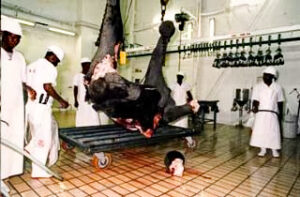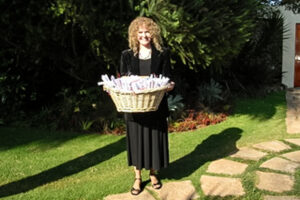 In 2005, I worked in South Africa researching a claim by the government of elephant overpopulation. The local conservationists I worked with, led by Dr. Audrey Delsink, had developed a successful contraception for the elephants on their reserve. When they offered it to the South African officials, they were asked “What’s in it for us?” Many South Africans see elephants as economic commodities rather than the highly evolved sentient beings that they are.
In 2005, I worked in South Africa researching a claim by the government of elephant overpopulation. The local conservationists I worked with, led by Dr. Audrey Delsink, had developed a successful contraception for the elephants on their reserve. When they offered it to the South African officials, they were asked “What’s in it for us?” Many South Africans see elephants as economic commodities rather than the highly evolved sentient beings that they are.
I spent over 75 hours in a week driving around Kruger National Park trying to find the supposed ecological damage that the elephants were causing and also looking for those huge herds. I found neither. Only a few solitary bulls. Dr. Patrick Omondi, the elephant official of the Kenya Wildlife Service at the time, told me he had the same experience.
Dr. Cynthia Moss of the Amboseli Trust for Elephants, who has conducted the world’s longest on going observation of an elephant herd (over 50 years by now!), told me: “Elephants will not eat themselves out of house and home.” Rather, they will pull back on their birth rate. I think that is so amazing! South Africa is on a propaganda campaign to get the world to support the slaughter of thousands of their Kruger Park elephants. Elephants are a rare treasure that belong to the world community. Unless we are content to accept a world for our grandchildren where the only elephant they will see is in a picture book, none of us should believe South Africa’s culling justifications.
 When I was back in the U.S., I went to numerous schools giving my multi-media presentation about elephants. The kids fell in love with elephants and wanted to help save them. So they wrote hundred’s of letters pleading on behalf of elephants. I returned to South Africa with the letters and a big basket (which took up all the space in my suitcase!) and on the eve of South Africa’s overturning their ban on elephant culling (May 1, 2008). I hand delivered, to the government officials, the wishes of the next generation to have elephants in their future. Each letter was rolled and tied with a ribbon.
When I was back in the U.S., I went to numerous schools giving my multi-media presentation about elephants. The kids fell in love with elephants and wanted to help save them. So they wrote hundred’s of letters pleading on behalf of elephants. I returned to South Africa with the letters and a big basket (which took up all the space in my suitcase!) and on the eve of South Africa’s overturning their ban on elephant culling (May 1, 2008). I hand delivered, to the government officials, the wishes of the next generation to have elephants in their future. Each letter was rolled and tied with a ribbon.
Visit our Youtube channel!
